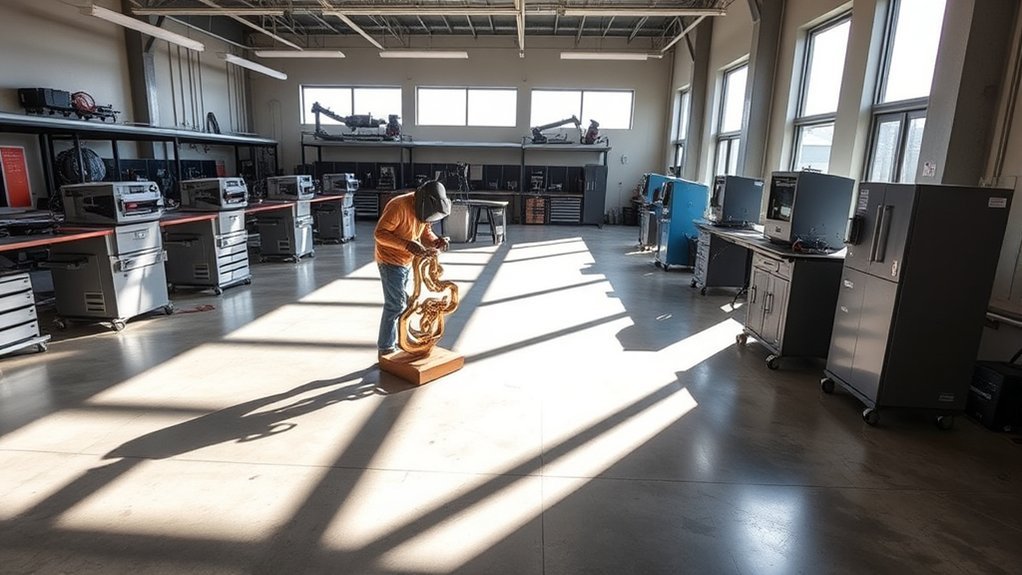The total cost of UTI’s welding program is about $19,000, but this can vary by campus location. This tuition covers expert training and hands-on experience in high-tech labs, but it excludes housing and food costs. Additionally, you should budget for tools, lab fees, and living expenses, which can range from $1,000 to $2,500 monthly. If you’re curious about financial aid and other expenses, there’s much more information available to help you.
Understanding UTI Tuition Structure

When considering the cost of the welding program at UTI, it’s important to understand the tuition structure and what it includes. The total cost is approximately $19,000, which encompasses expert training and hands-on practice in high-tech labs.
This tuition structure guarantees you’ll have access to field-standard equipment, providing a thorough learning experience. As part of your cost analysis, consider that UTI offers financial aid options, including scholarships and grants, with over $15 million available for qualifying students.
Additionally, make sure to budget for separate expenses like housing and food, as UTI doesn’t provide room and board. Using UTI’s net-price calculator can help you estimate your financial commitments accurately.
Breakdown of Tuition Costs

While evaluating the overall cost of the UTI welding program, it’s crucial to break down the tuition and related expenses.
The tuition for the program is approximately $19,000, with variations based on campus location and any available tuition discounts.
Here’s a quick breakdown of costs you should consider:
- Tuition: ~$19,000
- Course Duration: Varies by program
- Housing: Not included in tuition
- Food: Additional expense
- Lab Fees: For materials and equipment access
Keep in mind, the tuition covers expert training and hands-on practice in high-tech labs.
You can also use UTI’s net-price calculator to estimate your personalized costs, factoring in any financial aid you might qualify for.
Financial Aid Options Available

When considering UTI Welding School, it’s crucial to explore the financial aid options available to you.
UTI offers scholarships and grants, as well as loan options, to help manage tuition costs. Their Financial Aid office can assist you with completing the FAFSA.
Additionally, some employers may provide tuition reimbursement programs, further easing your financial burden.
Scholarships and Grants Available
Funding your education at UTI doesn’t have to be an intimidating task, thanks to a variety of scholarships and grants available for qualifying students.
UTI offers over $15 million in scholarships and grants, making it easier for you to reduce your tuition costs. Here are some key aspects to take into account:
- Scholarships and grants don’t require repayment
- UTI’s Financial Aid office helps with the grant application process
- Scholarship eligibility can vary based on academic and financial criteria
- The net-price calculator provides personalized tuition estimates
- Financial aid options guarantee you have multiple funding pathways
Loan Options Explained
Loan options at UTI Welding School provide essential financial support for students needing to cover tuition costs.
These loans come with structured repayment plans that start after graduation, allowing you to focus on your studies without immediate financial pressure. It’s important to evaluate the interest rates associated with these loans, as they can affect your total repayment amount over time.
UTI’s Financial Aid office can help you navigate these options, ensuring you choose a plan that fits your budget. Additionally, some employers may offer tuition reimbursement programs, which can further alleviate financial burdens.
FAFSA Assistance Offered
Maneuvering the financial aid landscape can be intimidating, but UTI’s Financial Aid office is here to simplify the process by offering thorough assistance with completing the FAFSA. This essential step is necessary for ensuring your financial aid eligibility, helping you access over $15 million in scholarships and grants that don’t require repayment.
Here are some FAFSA completion tips to keep in mind:
- Gather necessary documents like tax returns and Social Security numbers.
- Use the IRS Data Retrieval Tool for accuracy.
- Pay attention to deadlines to maximize your aid.
- Seek guidance from UTI’s financial aid advisors for personalized support.
- Review your Student Aid Report carefully for any discrepancies.
With the right help, you can confidently navigate your financial options.
Scholarships and Grants for Students

At UTI, you can access over $15 million in scholarships and grants each year to help offset your tuition costs.
These financial aid options don’t require repayment, making them a smart choice for eligible students.
To maximize your opportunities, it’s crucial to complete the FAFSA and understand the specific eligibility criteria for each scholarship and grant.
Available Financial Aid Options
If you’re considering UTI Welding School, you’ll be pleased to know that there are several financial aid options available to help manage tuition costs.
UTI offers over $15 million in scholarships and grants for qualifying students. Understanding financial literacy and employing budgeting strategies can greatly ease your financial burden.
Here’s a quick rundown of available options:
- Grants: Need-based funds that don’t require repayment
- Scholarships: Merit-based awards that help offset costs
- Loans: Borrowed funds that must be repaid
- FAFSA Assistance: Dedicated advisors to guide you through applications
- Financial Aid Office: Support in exploring various funding options
Eligibility for aid varies, so be sure to check specific criteria set by UTI and external sources.
Scholarships for Eligible Students
While exploring financial aid options, you’ll find that UTI offers a variety of scholarships specifically designed for eligible students.
With over $15 million available in scholarships and grants, UTI aims to help reduce your tuition costs. These scholarships are particularly beneficial since they don’t require repayment, easing your financial burden.
However, it’s important to understand the scholarship eligibility criteria, which vary based on specific conditions set by UTI.
To make the most of these financial aid resources, you can connect with UTI’s financial aid advisors. They’re there to assist you in exploring available scholarships and completing the FAFSA, ensuring you secure the funding you need to pursue your education in welding.
Grant Application Process
Understanding the grant application process is essential for students seeking financial aid at UTI. To maximize your chances of receiving funding, follow these key steps:
- Complete the FAFSA to assess grant eligibility.
- Gather necessary documentation, including income statements and tax returns.
- Review UTI’s specific application requirements for scholarships and grants.
- Consult with financial aid advisors for personalized guidance.
- Submit your application before deadlines to guarantee consideration.
Payment Plans and Loan Information

When considering the cost of UTI’s welding program, which totals around $19,000, it’s essential to explore the available payment plans and loan options.
UTI offers tuition flexibility through various payment plans, allowing you to spread your tuition costs over time. This can ease financial pressure while you focus on your studies.
In addition, financial aid options, including scholarships and grants, amounting to over $15 million for qualifying students, can help reduce your overall expenses. Completing the FAFSA is highly recommended to discover potential loan repayment options that fit your financial situation.
Moreover, some employers may offer tuition reimbursement programs, providing additional assistance to offset your educational costs after graduation.
Additional Expenses to Consider
When budgeting for UTI Welding School, it’s essential to take into account additional expenses beyond tuition.
You’ll need to account for housing and living costs, tools and equipment fees, and transportation expenses.
These factors can greatly impact your overall financial commitment to the program.
Housing and Living Costs
While attending UTI Welding School, it’s vital to factor in housing and living costs beyond just tuition.
These expenses can greatly impact your overall budget, so careful planning is important. Many UTI campuses don’t offer on-campus housing, which often leads to higher living costs.
Here are some key considerations:
- Explore local housing markets for affordability.
- Consider shared housing to cut costs.
- Account for monthly living expenses, which can range from $1,000 to $2,500.
- Factor in utilities, food, and transportation in your budget planning.
- Investigate financial aid options that may cover some living expenses.
Tools and Equipment Fees
As you plan your budget for UTI Welding School, it’s vital to account for tools and equipment fees, which can greatly impact your overall expenses.
In addition to tuition, you’ll need to budget for personal protective equipment (PPE) like helmets and gloves, as these costs aren’t included in your tuition.
Tool selection is important, as students often must buy their own welding tools, which can range from a few hundred to thousands of dollars. Some programs provide recommended lists to prepare you for hands-on training and future employment.
To guarantee accurate equipment budgeting, inquire about any additional fees for tools and equipment during the enrollment process, so you can estimate your total program costs effectively.
Transportation and Commute Expenses
Budgeting for UTI Welding School involves more than just tuition and tools; transportation and commute expenses also play a significant role.
When planning your finances, consider these commuting options and associated costs:
- Daily fuel and maintenance if driving
- Toll fees for highways
- Public transportation fares, like bus or train tickets
- Car insurance and parking fees at the campus
- Moving costs if relocating for the program
Incorporating these factors into your transportation budgeting helps guarantee you’re prepared for the total expenses.
What’s Included in Your Tuition
When you enroll in UTI welding school, your tuition includes a thorough package designed to equip you for success in the welding industry. The tuition benefits encompass expert training, certification preparation, and hands-on practice in various welding techniques.
You’ll have access to high-tech labs and field-standard equipment, enhancing your learning experience. In addition, the program features lifetime refresher courses, allowing you to maintain your welding skills over time.
Instructors with real-world knowledge and experience provide valuable insights, enriching your education. Moreover, your tuition covers guidance from admission through to your job search, facilitating a smooth shift into the workforce.
Job Placement and Career Services
UTI’s welding program prioritizes your career success by offering robust job placement and career services. These services are designed to enhance your career readiness and help you navigate the competitive job market effectively.
Here are some key features of UTI’s support:
- Strong industry partnerships with major automotive companies like Mercedes, Ford, and GM.
- Dedicated Career Services for resume building and interview preparation.
- Job search strategies tailored to optimize your employment opportunities.
- Access to a projected 45,800 job openings in the welding field from 2023 to 2033.
- Emphasis on real-world skills and certifications to meet employer expectations.
With these resources, you’ll be well-equipped to secure a rewarding position in welding and related fields after graduation.
Timing and Enrollment Information
Whether you’re keen to start a new career in welding or looking to enhance your skills, understanding the timing and enrollment options is essential.
The Universal Technical Institute (UTI) welding program spans 36 weeks, allowing you quick entry into the workforce. New classes begin every six weeks, offering flexible enrollment timelines that accommodate various schedules.
If you have a high school diploma or equivalent, you’re eligible to apply. Each cohort is limited to 24 students, ensuring you receive personalized attention during your training.
Additionally, financial aid, scholarships, and grants are available for qualifying students, making it more accessible to cover the tuition costs, which hover around $19,000.
Plan accordingly to secure your spot in this promising program.
Comparing UTI Costs With Other Welding Schools
While exploring your options for welding education, it’s important to compare the costs associated with different schools.
Conducting a UTI program comparison helps you understand your tuition value analysis. Here’s a quick breakdown of some alternatives:
A UTI program comparison can clarify the value of your welding education options.
- UTI Welding Program: Approximately $19,000 includes expert training and hands-on practice.
- Lincoln Electric Welding School: Courses range from $350 to $3,500.
- Tulsa Welding School: Professional Welder program costs about $18,000 for seven months.
- Advanced Welding Institute (AWI): Tuition averages around $20,000 for accelerated programs.
- Hobart Institute of Welding Technology: Programs range from $13,800 to $22,600.
Frequently Asked Questions
Are There Any Hidden Fees Not Included in the Tuition?
Yes, there can be hidden fees. When reviewing the tuition breakdown, consider additional expenses like equipment, materials, or lab fees. It’s crucial to clarify these costs with the school to avoid surprises later.
Can I Transfer Credits From Another School to UTI?
Yes, you can transfer credits to UTI. You’ll need to undergo a previous coursework evaluation, which assesses your courses against their curriculum. The credit transfer process guarantees you receive credit for relevant skills and knowledge.
What Is the Average Salary for UTI Welding Graduates?
UTI welding graduates often earn between $40,000 and $60,000 annually, depending on experience and location. Exploring various welding job opportunities can help you meet your salary expectations and enhance your career trajectory.
Is There an Age Limit for Enrolling in Welding Programs?
There isn’t a strict age limit for enrolling in welding programs. However, you’ll need to meet certain age requirements, often 18 or older, to start the enrollment process. Check with your chosen school for specifics.
Do I Need to Purchase My Own Welding Equipment?
You typically don’t need to purchase your own welding equipment, as schools often provide it. However, exploring welding equipment options and equipment financing solutions can be beneficial if you plan to work independently afterward.
Conclusion
In conclusion, understanding UTI’s tuition structure is essential for aspiring welders. With a variety of financial aid options, scholarships, and payment plans, you can find a feasible path to your future. Remember, investing in your education not only enhances your skills but also opens doors to dynamic job opportunities. As you weigh the costs, consider how UTI’s offerings stack up against other schools to guarantee you’re making a smart, strategic choice for your career.


